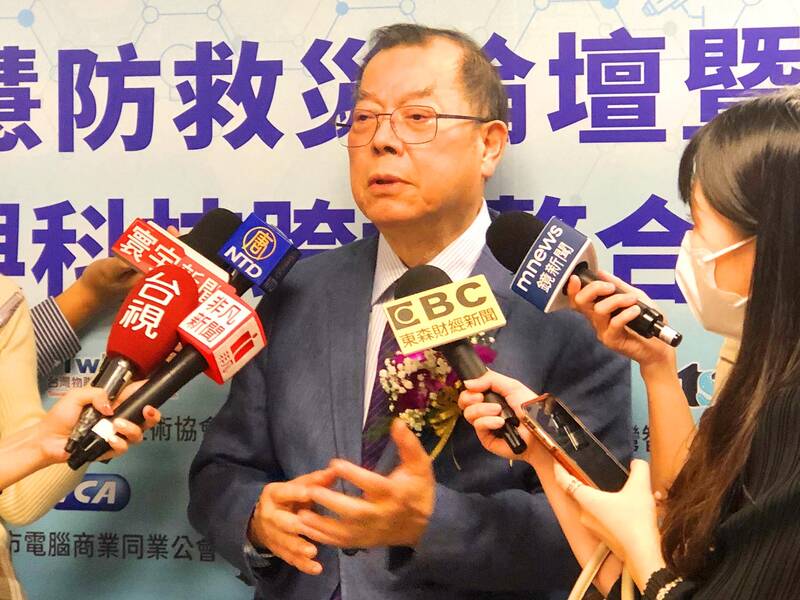The competitive advantage of Taiwan’s semiconductor industry is based on conditions created locally and the key to the industry’s development hinges on how to maintain its competitiveness rather than reducing reliance on the country by moving operations overseas, Powerchip Semiconductor Manufacturing Corp (力積電) chairman Frank Huang (黃崇仁) said on Wednesday.
Taiwan’s global dominance of semiconductor fabrication is built mainly on the back of high-caliber engineers, relatively low costs and the high cost-performance ratio of domestic industry, Huang said.
These factors enable chipmakers to push prices lower than their counterparts in the US and other countries, he said.

Photo: CNA
In such a situation, Taiwan Semiconductor Manufacturing Co (TSMC, 台積電) is highly profitable and can continue to invest heavily in advanced processes, thereby remaining the industry leader, he said.
Many conditions have allowed Taiwan’s semiconductor industry to maintain its edge, including professional engineers, the internationalization of the industry and government support for the building of new fabs, Huang said.
Without these conditions, that advantage does not exist, even if semiconductor manufacturing companies move their operations overseas or build new plants in the US, he said.
Huang’s comments came as the international community has begun to discuss the need for the semiconductor industry to reduce its reliance on Taiwan to minimize risks to the global economy amid geopolitical tensions and a major chip shortage.
Referencing this discussion of “de-Taiwanization” in the semiconductor industry, Huang said that the key to the sector’s future development is how to maintain its competitiveness, for instance, by continuing to cultivate top engineers through semiconductor technology and research institutions.
The government needs to keep providing resources including land, energy, water and tax incentives to support the industry’s development, he said.
The US semiconductor industry is the global leader in IC design and semiconductor manufacturing equipment, while Taiwan holds a leading position in the wafer manufacturing process, Huang said, adding that Taiwan’s competitive advantage cannot be easily replicated.
Successful semiconductor investment is not just about money, Huang said, adding that TSMC has 30 years of experience in industry development.
On Tuesday, TSMC announced that it would hold the first tool-in ceremony for its fab in Arizona next month to install the first batch of production equipment at the plant.
Taiwan has built its strength in the field and would be able to export its semiconductor technology, Huang said.
Regarding US efforts to jointly develop the industry with Japan, Huang said they still need Taiwan, citing the example of a joint venture between Japan’s Sony Group Corp, Denso Corp and TSMC to build a fab in Kumamoto.
National Development Council Minister Kung Ming-hsin (龔明鑫) earlier this week told a legislative session that removing Taiwan from the semiconductor supply chain would not be easy given the country’s strength in advanced semiconductor technology research and development.
The most important thing Taiwan can do is to continue working to strengthen its semiconductor supply chain resilience, Kung said.

Taiwan Semiconductor Manufacturing Co (TSMC, 台積電) yesterday said that its investment plan in Arizona is going according to schedule, following a local media report claiming that the company is planning to break ground on its third wafer fab in the US in June. In a statement, TSMC said it does not comment on market speculation, but that its investments in Arizona are proceeding well. TSMC is investing more than US$65 billion in Arizona to build three advanced wafer fabs. The first one has started production using the 4-nanometer (nm) process, while the second one would start mass production using the

A TAIWAN DEAL: TSMC is in early talks to fully operate Intel’s US semiconductor factories in a deal first raised by Trump officials, but Intel’s interest is uncertain Broadcom Inc has had informal talks with its advisers about making a bid for Intel Corp’s chip-design and marketing business, the Wall Street Journal reported, citing people familiar with the matter. Nothing has been submitted to Intel and Broadcom could decide not to pursue a deal, according to the Journal. Bloomberg News earlier reported that Taiwan Semiconductor Manufacturing Co (TSMC, 台積電) is in early talks for a controlling stake in Intel’s factories at the request of officials at US President Donald Trump’s administration, as the president looks to boost US manufacturing and maintain the country’s leadership in critical technologies. Trump officials raised the

‘SILVER LINING’: Although the news caused TSMC to fall on the local market, an analyst said that as tariffs are not set to go into effect until April, there is still time for negotiations US President Donald Trump on Tuesday said that he would likely impose tariffs on semiconductor, automobile and pharmaceutical imports of about 25 percent, with an announcement coming as soon as April 2 in a move that would represent a dramatic widening of the US leader’s trade war. “I probably will tell you that on April 2, but it’ll be in the neighborhood of 25 percent,” Trump told reporters at his Mar-a-Lago club when asked about his plan for auto tariffs. Asked about similar levies on pharmaceutical drugs and semiconductors, the president said that “it’ll be 25 percent and higher, and it’ll

CHIP BOOM: Revenue for the semiconductor industry is set to reach US$1 trillion by 2032, opening up opportunities for the chip pacakging and testing company, it said ASE Technology Holding Co (日月光投控), the world’s largest provider of outsourced semiconductor assembly and test (OSAT) services, yesterday launched a new advanced manufacturing facility in Penang, Malaysia, aiming to meet growing demand for emerging technologies such as generative artificial intelligence (AI) applications. The US$300 million facility is a critical step in expanding ASE’s global footprint, offering an alternative for customers from the US, Europe, Japan, South Korea and China to assemble and test chips outside of Taiwan amid efforts to diversify supply chains. The plant, the company’s fifth in Malaysia, is part of a strategic expansion plan that would more than triple